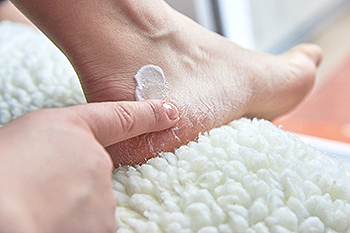Call Us Today! (203) 975-9600
SAME DAY APPOINTMENTS AVAILABLE
Common Culprits of Cracked Heels
Tuesday, 23 January 2024 00:00
Cracked heels (or fissures) often stem from a combination of factors that demand attention and care. One prominent contributor is dry skin, resulting from insufficient moisturization or exposure to harsh weather conditions. Prolonged standing or walking on hard surfaces can also lead to the development of cracked heels, subjecting the skin to excessive pressure. Wearing ill-fitting or open-back footwear may contribute, as these can fail to provide adequate support and lead to calluses, further exacerbating heel fissures. Certain medical conditions, including diabetes or thyroid disorders, may compromise skin health, making individuals more susceptible to cracked heels. Neglecting proper foot hygiene or engaging in excessive hot baths can strip the skin of essential oils, intensifying the risk. Recognizing these common causes of cracked heels empowers individuals to adopt preventative measures. If you have developed cracked heels that have become painful or infected, it is suggested that you consult a podiatrist for treatment options and prevention tips.
Cracked heels are unsightly and can cause further damage to your shoes and feet. If you have any concerns, contact one of our podiatrists from Preferred Footcare, LLC. Our doctors can provide the care you need to keep you pain-free and on your feet.
Cracked Heels
Cracked heels appear unappealing and can make it harder for you walk around in sandals. Aside from looking unpleasant, cracked heels can also tear stockings, socks, and wear out your shoes. There are several methods to help restore a cracked heel and prevent further damage.
How Do You Get Them?
Dry skin is the number one culprit in creating cracked heels. Many athletes, walkers, joggers, and even swimmers suffer from cracked heels. Age and skin oil production play a role to getting cracked heels as well.
Promote Healing
Over the counter medicines can help, especially for those that need instant relief or who suffer from chronic dry feet.
Wear Socks – Wearing socks with medicated creams helps lock in moisture.
Moisturizers – Applying both day and night will help alleviate dryness which causes cracking.
Pumice Stones – These exfoliate and remove dead skin, which allows for smoother moisturizer application and better absorption into the skin.
Change in Diet
Eating healthy with a well-balanced diet will give the skin a fresh and radiant look. Your body responds to the kinds of food you ingest. Omega-3 fatty acids and zinc supplements can also revitalize skin tissue.
Most importantly, seek professional help if unsure how to proceed in treating cracked heels. A podiatrist will help you with any questions or information needed.
If you have any questions, please feel free to contact our office located in Stamford, CT . We offer the newest diagnostic and treatment technologies for all your foot care needs.
Call Us Today! (203) 975-9600
SAME DAY APPOINTMENTS AVAILABLE








